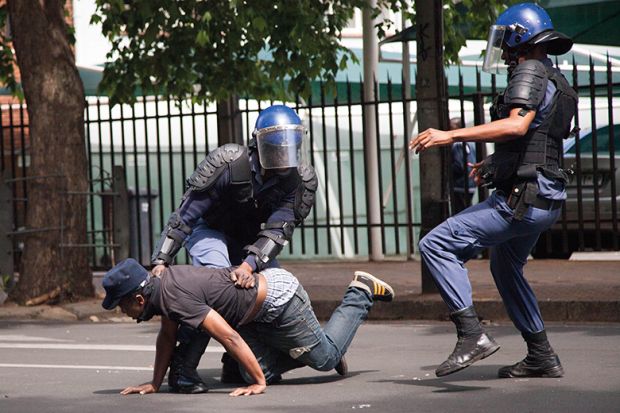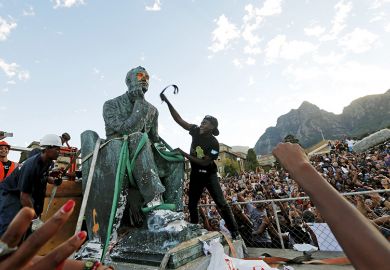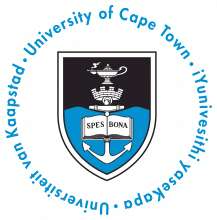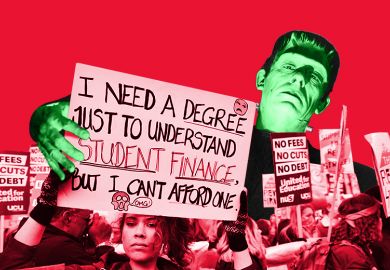Debates over the legacy of colonialism on South African campuses have been reignited by the publication of a report examining the impact of anti-fees and anti-racism protests that rocked the University of Cape Town.
The Institutional Reconciliation and Transformation Commission, which produced the report, was created in the wake of the Rhodes Must Fall protests – which resulted in the removal of the statue of Cecil Rhodes from Cape Town’s campus in 2015 – and the Fees Must Fall protests in 2016, which sparked protests across South Africa and ultimately resulted in the abolition of fees for poorer students.
The initial protests began a worldwide debate about the status of university monuments that are perceived to be tainted by racism or colonialism, but closer to home the protests had “a devastating impact on individuals, their families and communities, as well as the academic community as a whole”, according to the report.
The report says many students who had been involved in the protests had been suspended or expelled, with criminal charges brought against some, actions that had particular impact on students who were the first in their families to attend university.
It adds that the impact on the academic community was “most shocking”, with the protests causing divisions and cleavages along racial lines, and an overall “atmosphere of mistrust” among staff and between staff and students.
The commission concludes that racism “does exist at UCT”, going beyond attitudes and into institutional practice. “Submissions are rife with stories of better-qualified black academics being passed over for employment and promotion in favour of white academics,” says the report.
Tiri Chinyoka, acting chair of Cape Town’s Black Academic Caucus, told Times Higher Education that the assessment was “100 per cent correct”.
“Institutional and structural racism, as well as unjust discrimination, victimisation, and other forms of structural violence have been and continue to be our lived experience at UCT,” said Dr Chinyoka, a member of Cape Town’s department of mathematics and applied mathematics.
Dr Chinyoka said the reaction at UCT to the report had been “predictable”. Those who experienced racism and discrimination – largely black students and staff – had welcomed the report, “albeit also noting that the commissioners could have dug even deeper into the various issues”; while those who have traditionally benefited from or are implicit in policies that others perceive as discriminatory have reacted with denial, he claimed.
“Unfortunately, the university does not seem to be doing anything tangible to tackle the issues raised in the report,” Dr Chinyoka added.
However, Belinda Bozzoli, South Africa’s shadow higher education minister, criticised the report for being “conceptually weak and politically correct to a fault”.
“It seeks to apply the notion of ‘restorative justice’ in a setting where serious and often violent infringements were committed by students on academic freedom, artistic freedom, personal freedom and the stability of one of the most revered academic institutions in Africa,” said Professor Bozzoli, a former deputy vice-chancellor (research) at the University of the Witwatersrand.
“It is well known that UCT still suffers the wounds of this period of turmoil,” she said. “However, this report deals only with the perpetrators of protest – and indeed it is written from their point of view – and has little to say to those upon whom the acts were perpetrated: the vast majority of staff and students, and the university itself.”
The university said that “many lessons were learnt” from the protests of 2015 and 2016. The report will be given “appropriate consideration” at a meeting of the institution’s council in June, a statement said.
POSTSCRIPT:
Print headline: Reconciliation commission fails to heal Cape Town’s protest wounds
Register to continue
Why register?
- Registration is free and only takes a moment
- Once registered, you can read 3 articles a month
- Sign up for our newsletter
Subscribe
Or subscribe for unlimited access to:
- Unlimited access to news, views, insights & reviews
- Digital editions
- Digital access to THE’s university and college rankings analysis
Already registered or a current subscriber?










